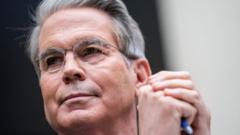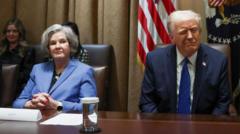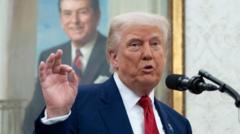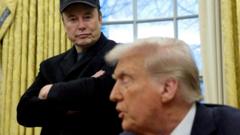Donald Trump's recent directives to cut funding and investigate contracts with Harvard raise concerns regarding the future of higher education in America. Critics argue these actions may attempt to reshape the educational landscape into a more conservative framework, while supporters claim it is a necessary challenge to what they perceive as liberal bias in institutions.
Higher Education Under Siege: The Trump Administration's Battle with Harvard
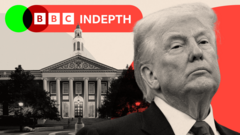
Higher Education Under Siege: The Trump Administration's Battle with Harvard
The Trump administration's confrontational measures against Harvard University signal a broader cultural and political battle impacting American higher education.
Article:
In a dramatic escalation of tensions, former President Donald Trump has recently directed aggressive measures against Harvard University, reflecting broader cultural and political battles over higher education in the United States. The past week has seen a flurry of significant actions, including Trump's threats to reallocate approximately $3 billion in Harvard's research funding to vocational schools, and a White House letter instructing federal agencies to scrutinize existing contracts with Harvard, amounting to about $100 million.
Trump's rhetoric underscores his view that "Harvard's got to behave themselves," accusing the institution of disrespect towards the nation. The aggressive nature of these actions represents a stark assault on one of the country's most prestigious educational establishments and suggests a shift in the relationship between the federal government and higher education.
As educators and students alike grapple with the ramifications of these directives, many express an unsettling sense of uncertainty and concern. Commencement ceremonies at Harvard this past Thursday were marked by a "palpable concern" among graduates, some voicing fears that if such measures can be enacted against Harvard, no university is safe from similar treatment.
The broader narrative suggests that these actions might not merely target a single university but could signify an ongoing campaign by conservative factions to undermine traditional liberal strongholds in academia. Some view Trump’s aggressive actions as an attempt to reshape the educational landscape by curbing liberal influences and advocating for a more conservative environment.
Compounding the tension, accusations directed at Harvard point to the university's handling of antisemitism, particularly in light of anti-Israel sentiments expressed during recent campus protests. Trump's administration has claimed that Harvard's response to such issues has been inadequate, fueling a call for systemic changes across campus policies pertaining to diversity and inclusion initiatives.
In the wake of Trump's mounting pressure, protests from academia have erupted, with institutions like Princeton and the University of Pennsylvania also facing funding cuts and investigations related to alleged antisemitic practices. The Education Department has concurrently launched probes into multiple universities, signaling a stark warning of potential suspensions of funding.
Critics argue that these measures represent a targeted assault on progressive academia by a government eager to reshape the educational sphere. Proponents of Trump's approach contend that institutions have strayed from their primary missions of fostering a balanced educational environment, alleging a pervasive liberal bias.
The pushback from Harvard has included legal challenges to halt the government’s efforts to impose consequences on foreign student admissions and the termination of federal grants, asserting that such actions threaten not only the institution's integrity but also critical areas of scientific research and discovery.
Supporters of the administration, including conservative leaders, assert that universities have become entrenched bastions of leftist ideology, affirming their right to challenge the established norms within academia. They argue that reshaping universities to align with more conservative values is both necessary and warranted.
As the ongoing conflict unfolds, the potential long-term impact on not just Harvard but the entire landscape of American higher education remains uncertain. Whether Trump's policies will ultimately gain ground or be mitigated through judicial interventions remains a question for educators, students, and policymakers alike.
The fallout from Trump’s combative stance resonates beyond immediate funding cuts, tapping into deeper societal divides and the contentious cultural landscape that characterizes contemporary American discourse. Universities may indeed find themselves entangled in a political battleground that calls into question their educational missions and autonomy in the years to come.
In a dramatic escalation of tensions, former President Donald Trump has recently directed aggressive measures against Harvard University, reflecting broader cultural and political battles over higher education in the United States. The past week has seen a flurry of significant actions, including Trump's threats to reallocate approximately $3 billion in Harvard's research funding to vocational schools, and a White House letter instructing federal agencies to scrutinize existing contracts with Harvard, amounting to about $100 million.
Trump's rhetoric underscores his view that "Harvard's got to behave themselves," accusing the institution of disrespect towards the nation. The aggressive nature of these actions represents a stark assault on one of the country's most prestigious educational establishments and suggests a shift in the relationship between the federal government and higher education.
As educators and students alike grapple with the ramifications of these directives, many express an unsettling sense of uncertainty and concern. Commencement ceremonies at Harvard this past Thursday were marked by a "palpable concern" among graduates, some voicing fears that if such measures can be enacted against Harvard, no university is safe from similar treatment.
The broader narrative suggests that these actions might not merely target a single university but could signify an ongoing campaign by conservative factions to undermine traditional liberal strongholds in academia. Some view Trump’s aggressive actions as an attempt to reshape the educational landscape by curbing liberal influences and advocating for a more conservative environment.
Compounding the tension, accusations directed at Harvard point to the university's handling of antisemitism, particularly in light of anti-Israel sentiments expressed during recent campus protests. Trump's administration has claimed that Harvard's response to such issues has been inadequate, fueling a call for systemic changes across campus policies pertaining to diversity and inclusion initiatives.
In the wake of Trump's mounting pressure, protests from academia have erupted, with institutions like Princeton and the University of Pennsylvania also facing funding cuts and investigations related to alleged antisemitic practices. The Education Department has concurrently launched probes into multiple universities, signaling a stark warning of potential suspensions of funding.
Critics argue that these measures represent a targeted assault on progressive academia by a government eager to reshape the educational sphere. Proponents of Trump's approach contend that institutions have strayed from their primary missions of fostering a balanced educational environment, alleging a pervasive liberal bias.
The pushback from Harvard has included legal challenges to halt the government’s efforts to impose consequences on foreign student admissions and the termination of federal grants, asserting that such actions threaten not only the institution's integrity but also critical areas of scientific research and discovery.
Supporters of the administration, including conservative leaders, assert that universities have become entrenched bastions of leftist ideology, affirming their right to challenge the established norms within academia. They argue that reshaping universities to align with more conservative values is both necessary and warranted.
As the ongoing conflict unfolds, the potential long-term impact on not just Harvard but the entire landscape of American higher education remains uncertain. Whether Trump's policies will ultimately gain ground or be mitigated through judicial interventions remains a question for educators, students, and policymakers alike.
The fallout from Trump’s combative stance resonates beyond immediate funding cuts, tapping into deeper societal divides and the contentious cultural landscape that characterizes contemporary American discourse. Universities may indeed find themselves entangled in a political battleground that calls into question their educational missions and autonomy in the years to come.










